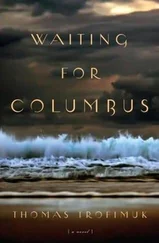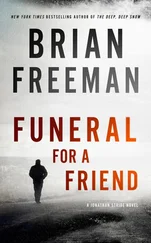You’re weird, Manteli ,
she says with a loud laugh (she’s quoting Svensson’s New York escape attempt). I raise the glass, we take turns draining the vodka, the ice clinks. With the cold vodka in my mouth I kiss Tuuli, but her thin lips remain closed. She smiles, Wordsworth on the table draws his wings very slowly to his body (he has ceased his defense). Tuuli points with the blade at the bird, I press it down on the table again. The knife slowly pierces his soft breast, first carefully, the second time already more forcefully. Again and again Tuuli stabs into the bird (she will have given Lua the heart).
Elisabeth’s Musical Streak
By the fountain near the gate
There stands a linden tree
I dreamed in its shade
Many a sweet dream.
I carved in its bark
Many a dear word,
In joy and in sorrow
I was drawn to it always
Brazilian garlic chicken
On the table there’s a list of things to cook. The rooster we stuff with pimento, coriander, and half a clove of garlic in each knife cut. Tuuli ties the legs together with poultry string, I chop onions and shallots, we add pepper and salt and oil, then Tuuli puts Wordsworth back in the fridge. We’ve stopped talking. She takes flour and sugar out of the cabinets, we peel apples and soak raisins in rum, we melt butter, I clean radicchio and Tuuli dices tomatoes, she removes the seeds from red peppers, I from yellow ones (Daisy Duck laid two eggs). I wonder why we’re preparing such massive amounts of food. We wash strawberries, we roast pine nuts, we rinse fava beans. Tuuli and I circle each other, since the kiss we haven’t touched. We chop flat-leaf parsley, sage, basil, green olives, black olives, garlic, capers, we squeeze lemons and oranges, we scrape out vanilla pods, we beat aioli, I with the whisk, she pours in olive oil from a small canister. Out of flour and oil we knead pizza dough. Potatoes and tomato sauce are cooking on the stove, apple pie is baking in the oven. We drink another vodka, and Tuuli smokes a cigarette (I say no thanks).
Interview (main informant)
MANDELKERN: Why are we actually cooking all this stuff?
TUULI: Lua’s dying, Manteli , he hasn’t eaten anything for days.
M: And now all this at once? But that’s not healthy.
T: The food is for the guests.
M: I had no idea that guests were coming.
T: Well, you were rummaging around in Svensson’s things instead of asking questions.
M: I was sick.
T: Cigarette?
M: Did Svensson really collect cigarettes?
T: I’m only one of the characters from Astroland .
M: Maybe even the most important one.
T: So no cigarettes today?
M: I don’t actually smoke.
T: The stories are one-third truth, one-third fiction and one-third the attempt to glue the other two together with words.
M: You were really together in New York?
T: In New York, in Seraverde, in Oulu.
M: Is the boy an American?
T: He has several passports.
M: And who’s the father, if I may ask? Svensson writes at least ten times that you were not alone but were three.
T: Are you familiar with the Borromean rings, Manteli ?
M: No. But that Kiki mentioned them.
T: Then look it up and ask me about Lua instead.
M: What?
T: Ask me: was Lua really once named Lula?
M: What about Blaumeiser’s death?
T: Felix was too careless. He was waiting for us, he drank more than you and Svensson together. He lived himself to death. But one thing at a time. Ask me about Lua and Svensson about the rest.
M: Okay. — So was Lua really once named Lula?
T: Yes. Lula da Silva was the watchdog of a policeman named Santos.
M: Did Felix really shoot off Lula’s leg?
T: Yes. And then I sawed off Lua’s leg with a saw from the carpenter’s workshop, and sewed together the flaps of skin with sewing thread.
M: Svensson writes of a bolt cutter.
T: He writes like a bolt cutter. Or do you think Wordsworth and Naish really existed? It sounds good, but it’s not the truth.
M: How long do chickens live?
T: Here chickens don’t live to be one year old, Manteli , Svensson always gives his animals the same names. He keeps his eyes fixed on the past with sentimental tricks. And he collects the dead, because the living are too much in motion for him. Things pass away, but Svensson imagines that his stories remain.
M: Isn’t that why we tell stories? Writers glue fiction and truth together, they preserve the world otherwise than it is. That’s why that Kiki paints pictures and photographs animals and garbage. Isn’t it?
T: Is it? I’m not a psychologist, Manteli , I amputate. It would be best for you to ask Kiki herself.
M: Are we cooking for Kiki?
T: I’m here only because of Samy. I face forward.
M: Svensson is Samuli’s father?
T: I face forward, and you’re standing in front of me. Even if you are strange, Manteli .
Drink with me!
says Tuuli, juo minun janssani! What I say: Cheers! What she replies: kippis! What I think: that I’m going to kiss her again, once we’ve emptied this glass, in her green bikini, her thin body will be lighter than Elisabeth’s, her breasts smaller. I will compare, as Svensson compared, I will touch the possibility of another life, this kiss will be the attempt to take two paths (where does that bring me?). We drink. Tuuli takes the Polaroid off the fridge and holds it next to the red-wine-stained picture on the kitchen wall. Shitty City, she reads, and tells me about Oulu and the Hotel Turisti. We drink. Tuuli talks about the cold of the Finnish winter, about her father in the Arctic Circle and about the Borromean rings. The rings were just like them, Blaumeiser, Svensson, and Tuuli herself. We keep an eye on the pie in the oven. When I finally do put my hand on Tuuli’s back so as to bend down again toward her mouth, so as not to let this opportunity pass, she says that I touch her as if I never touched a woman before, as if she were made of cotton candy.
Nice to see you
Now I’m sitting at Svensson’s desk again in front of my notebook, out of breath and ambushed for the second time this afternoon by the arrival of a woman. I kissed Tuuli, she bathed my mouth in coriander and icy cold, the hair on the back of her neck still damp from the lake water ( suutele minua! ). I could observe us as we kissed, her fingers, my hands between her shoulder blades. After a few seconds, the squeak of the sliding door stabbed Tuuli’s and my ears, in my head the thought of Svensson and the death of the dog, in Tuuli’s eyes the fright at her fatherless son in the doorway of the kitchen, my thought of Elisabeth in Hamburg, in Tuuli’s face maybe the possibility of a first self-caught fish in Samy’s small hands (in me Elisabeth’s red hair, her red dress, her green eyes). But then a woman’s voice from below, speaking English: Where the fuck are you, Svensson? Tuuli and I jumped apart like two teenagers, we fell away from each other, we looked at each other, she put her index finger to my mouth and her other hand on my chest, I brushed a wet strand of hair behind her ear (her smile, my smile). I took a hairpin out of her hair, and when the sound of women’s heels on the stone steps approached, I pushed myself off Tuuli as I had off buoy 1477, and disappeared into Svensson’s study (I swam ashore). Where is everybody? the woman’s voice asked on the steps, what’s going on here? A few seconds later I heard the English-speaking voice in the kitchen say “look at that!” and finally, after a brief pause and a few footsteps through Svensson’s kitchen, the name I’ve often read in the past few days and have been finding everywhere in Svensson’s house: Tuuli Kovero, this voice declares, nice to see you again! Tuuli’s reply: Kiki!
Читать дальше












